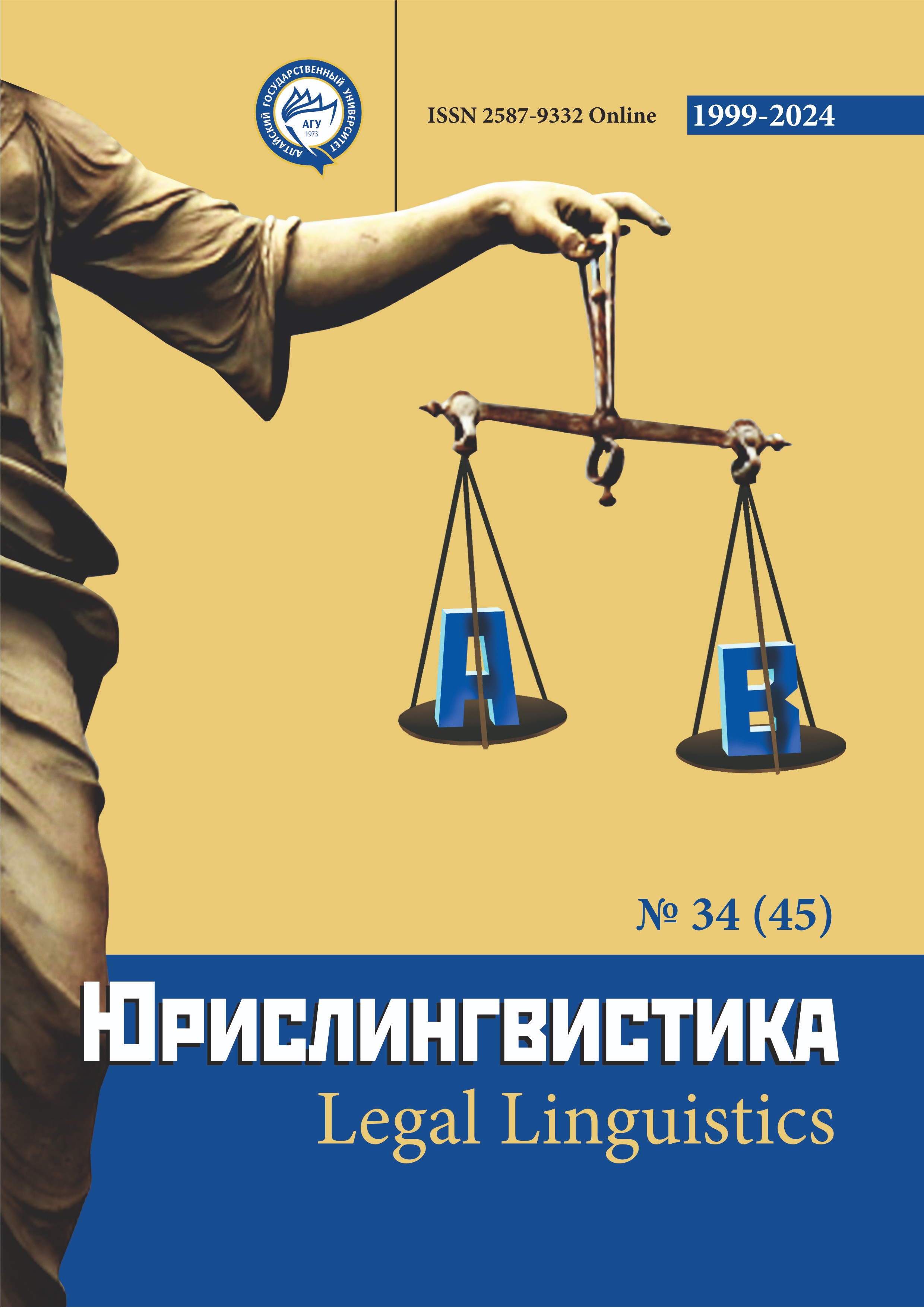Linguistic Features of Legal Texts
УДК 343.01, ББК 67.408
Abstract
The article concerns the study of universal professional-specific parameters for writing legal texts. The author notes that modern society needs the development of functional literacy, including the ability to draw up legal documents. This requires not only legal, but also linguistic knowledge. The characteristics of a legal document according of T.V. Kashanina are: regulation of social relations, basis on the rule of law, publication within the scope of competence, establishment of rights and obligations, generation of legal consequences, requirement of professional knowledge, availability of details. The article examines various linguistic means of the language of law: general linguistic (clarity, accuracy, conciseness), lexical, syntactic and stylistic. Particular attention is paid to vocabulary. The importance of consistent use of terms with clear meanings is noted. The features of the use of nouns and verbs in legal texts are given. It has been revealed that nouns can be used to list competencies (acceptance, approval, establishment, etc.), and verbs are used mainly in the active voice to focus attention on the subject of the action. The set of verbs depends on the type of document and scope of application. It is concluded that linguistic features make it possible to distinguish a legal text from a variety of documents. Legal language is considered difficult to understand, so it is important to maintain pattern and standardization when creating legal texts, while the style of statement and selection of vocabulary should ensure clarity for any reader. The scientific novelty of the study lies in the fact that for the first time, using the material of the Russian language of law, various features and errors of the legal text have been described and systematized. As a result of the study, it was established that the process of drawing up a legal text is complicated not so much by the lack of legal knowledge as by a lack of understanding of the rules for using the Russian language in law.
Downloads
Metrics
References
Апт Л. Ф. О системной связи определений понятий российского законодательства / Юридическая техника. – 2007. – №1. – С. 111-115.
Варлакова Т. В. Лингвистические особенности научных юридических текстов / Научный вестник Омской академии МВД России. – 2014. – № 3(54). – С. 58-62.
Васильева Т. А. Как написать закон. 3-е изд., перераб. и доп. М., 2024.
Губаева Т. В., Пиголкин А. С. Лингвистические правила законодательной техники / Проблемы юридической техники: сб. статей / под ред. В.М. Баранова. Н. Новгород, 2000.
Дмитриев Р., Якимова Е. Юридический текст без ошибок. Как улучшить стиль письма и справиться со сложными случаями грамматики. М., 2023.
Ивакина Н. Русский язык российского права / Российская юстиция. – 2000. – №7. – С. 27-28.
Карагина Д. О. О терминологических коллизиях и других несовершенствах статей 285.1, 285.2 УК РФ / Юрислингвистика. – 2023. – 30. – С. 26-31.
Кашанина Т. В. Юридические документы. Чему не учат студентов. Как правильно понять и подготовить: учебник. М., 2024.
Котюрова М. П. Культура научной речи: текст и его редактирование: учеб. пособие. М., 2008.
Растамханова С. Н. Жанровое многообразие и подстили официально-делового стиля / Форум молодых ученых. – 2018. - №1 (17). - С. 927-932.
Ситникова А. И. Законодательная текстология уголовного права / Lex Russica. - 2017. - №3 (124). - С. 106-122.
Тыдыкова Н. В. О технике конструирования уголовного закона / Юрислингвистика. – 2023. – 30. – С. 43-49.
Хазова О. А. Искусство юридического письма. 4-е изд., испр. и доп. М., 2017.
Copyright (c) 2024 Елена Зорина

This work is licensed under a Creative Commons Attribution 4.0 International License.
The authors, which are published in this journal, agree to the following conditions:
1. Authors retain the copyright to the work and transfer to the journal the right of the first publication along with the work, at the same time licensing it under the terms of the Creative Commons Attribution License, which allows others to distribute this work with the obligatory indication of the authorship of this work and a link to the original publication in this journal .
2. The authors retain the right to enter into separate, additional contractual agreements for the non-exclusive distribution of the version of the work published by this journal (for example, to place it in the university depository or to publish it in a book), with reference to the original publication in this journal.
3. Authors are allowed to post their work on the Internet (for example, in a university repository or on their personal website) before and during the review process of this journal, as this may lead to a productive discussion, as well as more links to this published work (See The Effect of Open Access).










